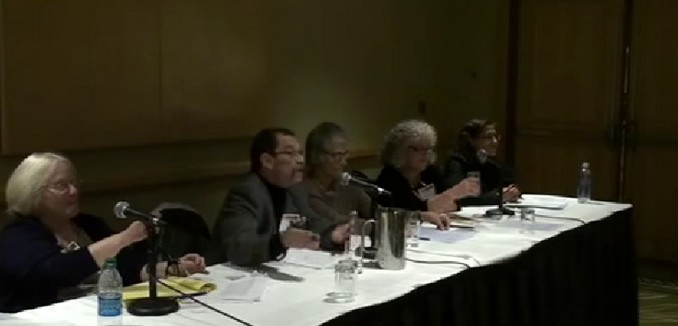The American Historical Association, the largest society of historians and professors of history in the United States, voted down anti-Israel resolutions at their annual meeting yesterday.
Inside Higher Ed reports:
At their annual meeting here, members of the American Historical Association rejected — by a vote of 144 to 51 — an opportunity to vote on a set of resolutions critical of Israel. …
But Sunday’s vote focused on a single issue: whether or not the association would suspend a bylaw requiring that all business meeting agenda items be submitted by Nov. 1, to give members traveling to the annual January conference time to plan accordingly. The Israel resolutions were submitted on Dec. 22. On Friday, the first day of the conference, the association’s council declined to put the resolutions on the business meeting agenda directly, citing concerns about fairness and members’ ability to attend the meeting based on existing travel plans.
Suspending the bylaws would have required two-thirds of at least one hundred members voting.
Introducing a measure to an academic organization and having only a limited number of members vote has been a common tactic among anti-Israel activists. When the American Studies Association voted in late 2013 to boycott Israel, only about one-sixth of the organization’s membership actually voted to boycott.
The Alliance for Academic Freedom, a group opposing the resolution, published a letter admonishing the resolution on a number of grounds, including that it “overlooked key facts and context.”
The resolutions also omit the necessary context for the security restrictions Israel places on its policy regarding the travel of foreign citizens. After the breakdown of peace negotiations between Israel and the Palestinian Authority, the rise of suicide bombers and other terrorist threats to civilians led Israel to introduce measures to protect its population. Restrictions to the movements of Israelis, Palestinians, and foreigners from Israel to the West Bank must be viewed in this light.
Context is also missing from the “Resolution on Protecting the Right to Education in Palestine-Israel.” The resolution states that on August 2, 2014 Israeli Defense Forces bombed the Islamic University in Gaza, which houses the Oral History Center.10 But according to IDF intelligence, the Islamic University was targeted because of its role both in manufacturing and firing bombs. Middle East commentator Ehud Yaari has explained that the target of this strike was an “R&D facility within the campus serving Izz al-Din al-Qassam Brigades [Hamas’s military wing] where different components of rockets were manufactured. In this facility professors, lecturers and other staff members of the science faculties were working for years on production of rockets—including those with a range to hit deep into Israel—improving the explosive payload and seeking ways to introduce guidance systems. On several occasions rockets were fired from different spots within the campus. The Oral History center was never targeted but there may have been collateral damage.” Indeed, it remains unclear whether the archive was actually damaged at all or whether the oral histories recorded therein survived the attack, in digital or other form. Before the AHA condemns Israel for this attack, whose facts are in dispute, it must at least investigate the incident.
Professor William Jacobson of the “Legal Insurrection” blog, a leading opponent of anti-Israel activism on campuses, wrote:
Based on the Twitter feed, it appears that the motion to suspend the rules met spirited opposition on a variety of grounds, including the lack of good grounds for missing the deadline, the importance of providing adequate time to fact check the resolution, and the merits of the ultimate resolution.
The vote at the business meeting was taken just minutes ago.
The motion failed, with 144 voting No, 54 voting Yes, and 3 voting Present. So the Resolutions will not even be debated, much less sent to the membership.
Sanity prevailed someplace in academia. A good start to the New Year.
[Photo: hnneditor / YouTube ]




